|
Books Should Be Free Loyal Books Free Public Domain Audiobooks & eBook Downloads |
|
|
Books Should Be Free Loyal Books Free Public Domain Audiobooks & eBook Downloads |
|
Fiction |
|---|
|
Book type:
Sort by:
View by:
|
By: Robert Pitcher Woodward (1866-) | |
|---|---|
 On A Donkey's Hurricane Deck
On A Donkey's Hurricane Deck
" A Tempestous Voyage of Four Thousand and Ninety-Six Miles Across the American Continent on a Burro, in 340 Days and 2 Hours - starting without a dollar and earning my way." The journey could be accomplished in 5 days by train, but the author took close to a year to work his way across the country. This is a witty and amusing account of one man (and his donkey)'s adventures crossing the American continent from New York to San Francisco. | |
By: Robert Sheckley (1928-2005) | |
|---|---|
 The Status Civilization
The Status Civilization
Will Barrent awakes without memories just before being deposited on Omega, a planet for criminals where the average life expectancy is 3 years. He’s listed as a murderer and released into the illicit society as a “peon” the lowest class imaginable. A mysterious girl gives him a weapon that starts him on his path to status, a path that requires constant brutality. But it must be borne if our hero is to discover the reason for his imprisonment; A reason that pits him against himself, and involves the sardonically similar but devoutly different creeds of Omega and Earth... | |
 Watchbird
Watchbird
3 Robert Sheckley short stories that demonstrate the breathof his fantastic imagination. In Watchbird, the question "can machines solve human problems?" is answered with a resounding YES! But there may be a few unforeseen glitches. Just a few. Warrior Race drops us into an alien race of warriors who fight in a way you will never be able to imagine until you listen. And Beside Still Waters is a gentle story that shows us a man who really wants to get away from it all ... sitting on a rock in the asteroid belt with only a robot for a friend. No girls allowed! A poignant and unsettling story to say the least. | |
By: Robert Silverberg (1935-) | |
|---|---|
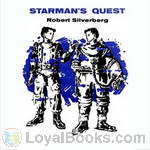 Starman's Quest
Starman's Quest
Travelling at speeds close to that of light, spacemen lived at an accelerated pace. When one of the twin boys left the starship, he grew older while his twin in space barely aged. So the starship twin left the ship to find what happened to his brother who was aging away on earth. | |
By: Robert Silverberg and Randall Garrett (1935-) | |
|---|---|
 The Judas Valley
The Judas Valley
Why did everybody step off the ship in this strange valley and promptly drop dead? How could a well-equipped corps of tough spacemen become a field of rotting skeletons in this quiet world of peace and contentment? It was a mystery Peter and Sherri had to solve. If they could live long enough! [from the Judas Valley]Originally published in Amazing Stories, October 1956 | |
By: Robert Smith Surtees (1805-1864) | |
|---|---|
 Ask Mamma: or The Richest Commoner In England
Ask Mamma: or The Richest Commoner In England
Considering that Billy Pringle, or Fine Billy, as his good-natured friends called him, was only an underbred chap, he was as good an imitation of a Swell as ever we saw. He had all the airy dreaminess of a hereditary high flyer, while his big talk and off-hand manner strengthened the delusion. It was only when you came to close quarters with him and found that though he talked in pounds he acted in pence, and marked his fine dictionary words and laboured expletives, that you came to the conclusion that he was “painfully gentlemanly... | |
By: Robert Smythe Hichens | |
|---|---|
 The Return of the Soul
The Return of the Soul
Can the soul of the dead come back to haunt the one who was responsible for its death? What would happen if the responsible one did not believe it could be so, and yet was in love with the returned soul? The Return of the Soul is a horror story of a man who is visited by the returning soul of a deceased, and who has some very perplexing issues to deal with upon that return. (Introduction by Roger Melin) | |
 Green Carnation
Green Carnation
The Green Carnation, first published anonymously in 1894, was a scandalous novel by Robert Hichens whose lead characters are closely based on Oscar Wilde and Lord Alfred Douglas - also known as 'Bosie', whom the author personally knew. It was an instant succès de scandale on both sides of the Atlantic. The book features the characters of 'Esmé Amarinth' (Wilde), and 'Lord Reginald (Reggie) Hastings' (Douglas). The words put in the mouths of the hero and his young friend in the story are mostly gathered from the sayings of their originals... | |
 Tongues of Conscience
Tongues of Conscience
Tongues of Conscience (1898) is a collection of five thought-provoking stories where an innocent, but selfish, action leads to horrific consequences. Robert Hichens writes some wonderfully evocative descriptions of nature: from a raw and exposed violent seascape, to the serene and idyllic countryside “…the violets seemed to sing in odours…” , to a train pushing through the white-out of a blizzard. In Sea Change an artist with a dark secret (“…I painted for him in words, the varying colors of waves in different seas… I drowned little Jack in the sea... | |
By: Robert Tressell | |
|---|---|
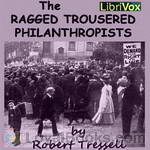 The Ragged Trousered Philanthropists
The Ragged Trousered Philanthropists
Clearly frustrated at the refusal of his contemporaries to recognise the iniquity of society, Tressell’s cast of hypocritical Christians, exploitative capitalists and corrupt councillors provide a backdrop for his main target — the workers who think that a better life is “not for the likes of them”. Hence the title of the book; Tressell paints the workers as “philanthropists” who throw themselves into back-breaking work for poverty wages in order to generate profit for their masters... | |
By: Robert W. Chambers (1865-1933) | |
|---|---|
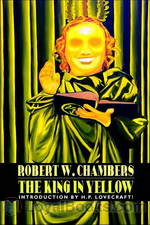 The King in Yellow
The King in Yellow
Robert W. Chambers (1865-1933) studied art in Paris in the late 80’s and early 90’s, where his work was displayed at the Salon. However, shortly after returning to America, he decided to spend his time in writing. He became popular as the writer of a number of romantic novels, but is now best known as the author of “The King In Yellow”. This is a collection of the first half of this work of short stories which have an eerie, other-worldly feel to it; but the stories in the second half are essentially love stories, strongly coloured by the author’s life as an artist in France... | |
 The Flaming Jewel
The Flaming Jewel
During the last two years, Fate, Chance, and Destiny had been too busy to attend to Mike Clinch. But now his turn was coming in the Eternal Sequence of things. The stars in their courses indicated the beginning of the undoing of Mike Clinch. In the North Woods, mayhem ensues as three parties vie for possession of the Flaming Jewel. Become immersed in the chasing and slinking to determine who will possess this famed jewel. Better than typical adventure writing magnificently describe the 19th Century Northeastern US in this great novel. | |
By: Robert W. Service (1874-1958) | |
|---|---|
 Selections from Ballads of a Cheechako
Selections from Ballads of a Cheechako
These twelve poems are from Ballads of a Cheechako which was Robert W. Service’s third book of Yukon poems, published in 1909. The word Cheechako, from Chinook Jargon, originated in the United States (Alaska) and Canada (Yukon) and was imported into local English during the Yukon gold rush that began in 1896. Cheechako, is a non derogatory word meaning “newcomer” or “tenderfoot.” The derivation looks something like this: chee new cha come ko home. | |
 Ottawa Folk Festival Robert Service Collection
Ottawa Folk Festival Robert Service Collection
The Spell of the Yukon by Robert Service with patrons, musicians and organizers. Robert Service is an iconic Canadian poet. | |
By: Rolf Boldrewood (1826-1915) | |
|---|---|
 Robbery Under Arms
Robbery Under Arms
A tale of cattle duffing, horse stealing and bushranging in the New South Wales outback with Captain Starlight.To quote the author "though presented in the guise of fiction, this chronicle of the Marston family must not be set down by the reader as wholly fanciful or exaggerated. Much of the narrative is literally true, as can be verified by official records. A lifelong residence in Australia may be accepted as a guarantee for fidelity as to local colour and descriptive detail." | |
By: Romain Rolland (1866-1944) | |
|---|---|
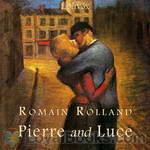 Pierre and Luce
Pierre and Luce
Pierre and Luce were an unlikely young pair who found themselves in the chaos of Paris during the war; Pierre, the shy, recently conscripted pacifist, and Luce, the free spirited artist in training, and both confused about the things going on around them. Why were these war birds flying overhead? Why these warning sirens, and occasional bombs exploding in the distance? Why did the government leaders, who didn't even know one another, hate and destroy so much? Why did these two delicate young adults find each other now? This story takes place between January 30 and Good Friday, May 29, 1918. (Introduction by Roger Melin) | |
By: Rosa Campbell Praed (1852-1935) | |
|---|---|
 Lady Bridget in the Never-Never Land
Lady Bridget in the Never-Never Land
Following a failed love affair in England, Lady Bridget O'Hara accepts an invitation to travel to colonial Australia as companion to Lady Rosamund Tallant, the wife of the newly-appointed governor of Leichardt's Land. In Leichardt's Town, Lady Bridget, also known as Biddy, is reunited with her old friend and collaborator, Joan Gildea, special correspondent for The Imperialist newspaper. While visiting Joan, Biddy meets Colin McKeith, a roughly-hewn, Scottish-born pioneer, drover, miner, sometime-politician, and magistrate in the north-eastern colony... | |
 Policy and Passion
Policy and Passion
"Policy and Passion, a Novel of Australian Life" tells the story about a father and daughter, torn between the policy of the country in which they live and the passions both have. The father, Thomas, is a rising politician until his love for a married woman changes the game while the daughter, Honora, falls in love with an English nobleman. But this is not only a love story. This novel tells about the early days of Australia, and tells the story of a whole community. It receives scholarly attention as a work about colonialism. - Summary by Stav Nisser | |
 Rebel Rose
Rebel Rose
The Rebel Rose is the story of Mary Stuart Beaton, a descendant of Mary Queen of Scots who has come to London in the hope of having her family claims legitimized. The Pretendress -- as she is called, finds herself caught up in the devices of her own personal guardians as well as a scheming London society woman scorned by a powerful member of Parliament who has become an admirer of the Princess. Apart from the claims of royalty, Mary Beaton knows where her worth is found and she proves to be a formidable opponent for all those scheming for and against her. | |
By: Rosalind Goforth (1864-1942) | |
|---|---|
 Chinese Diamonds for the King of Kings
Chinese Diamonds for the King of Kings
In this small book Rosalind Goforth tells many stories of 'diamonds' in China that have been tested and come out pure in the King of Kings' hand for His service. Sketch 9 speaks of the awful facts of the "heathen" that Rosalind Goforth had witnessed. Although she speaks of these as being confined to merely non-Christian persons, many of these evils are characteristics of people in countries generally classified as "Christian". Please be advised that this fact may cause this chapter to be offensive to some. | |
By: Rosanna Eleanor Leprohon (1829-1879) | |
|---|---|
 Afternoon in July
Afternoon in July
LibriVox volunteers bring you 14 recordings of An Afternoon in July by Rosanna Eleanor Leprohon. This was the Fortnightly Poetry project for July 7, 2013.Rosanna Eleanor Leprohon, born Rosanna Eleanor Mullins, was a Canadian writer and poet. She was "one of the first English-Canadian writers to depict French Canada in a way that earned the praise of, and resulted in her novels being read by, both anglophone and francophone Canadians."Leprohon's novels were popular in both English and French Canada in the late 19th-century, and were still being reprinted in French in the mid-1920s... | |
By: Roswell Field (1851-1919) | |
|---|---|
 The Romance of an Old Fool
The Romance of an Old Fool
A light-hearted account of a successful middle aged widower who chances to visit the small town in which he grew up to renew old acquaintances and perhaps reflect on his successes since his departure.This visit, however, becomes far more to him than he would have imagined, as he finds that one of his dearest childhood girlfriends had died not long after his departure, and the widower envisions a relationship with none other than her daughter, who he senses to be her mother incarnate. | |
By: Roy J. Snell (1878-1959) | |
|---|---|
 The Blue Envelope
The Blue Envelope
A mystery and adventure story for girls set in Alaska. | |
By: Rudolf Erich Raspe (1737-1794) | |
|---|---|
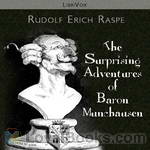 The Surprising Adventures of Baron Munchausen
The Surprising Adventures of Baron Munchausen
The stories about Münchhausen were first collected and published by an anonymous author in 1781. An English version was published in London in 1785, by Rudolf Erich Raspe, as Baron Munchhausen's Narrative of his Marvellous Travels and Campaigns in Russia, also called The Surprising Adventures of Baron Munchhausen. It is not clear how much of the story material derives from the Baron himself; however, it is known that the majority of the stories are based on folktales that have been in circulation for many centuries before Münchhausen's birth. | |
By: Rudyard Kipling (1865-1936) | |
|---|---|
 Kim
Kim
Present day readers live in a world that's emerged from the Cold War and the endless rivalry of the Super Powers but this book goes back and traces the origins of the conflict and mutual antagonism between nations. Kim by Rudyard Kipling is set against the background of the Great Game as it was called the tug-of-war between Britain and Russia for the control of Central Asia. The novel's action takes place during the Anglo-Afghan Wars of 1839-42. The novel's sweeping narrative, the depth of character and the sheer historical scale make it a first rate story... | |
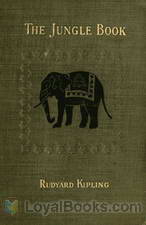 The Jungle Book
The Jungle Book
Originally written for his young daughter Josephine, who died tragically aged six, The Jungle Book by Rudyard Kipling is a collection of short stories which were published separately in magazines before being compiled into a book. The stories are in the form of fables, where animals communicate and speak to each other as humans do and the purpose of each story was to convey a moral or message to the reader. Modern readers would be more familiar with the Disney animated version in which Mowgli the little “man-cub” is raised by wolves... | |
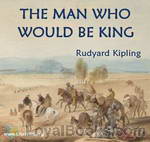 The Man Who Would Be King
The Man Who Would Be King
The Man Who Would Be King tells the story of two British adventurers in British India who become kings of Kafiristan, a remote part of Afghanistan. It was inspired by the exploits of James Brooke, an Englishman who became the “white Raja” of Sarawak in Borneo, and by the travels of American adventurer Josiah Harlan, who claimed the title Prince of Ghor. The story was first published in The Phantom Rickshaw and other Tales (Volume Five of the Indian Railway Library, published by A H Wheeler & Co of Allahabad in 1888)... | |
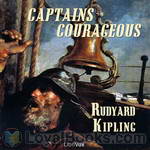 Captains Courageous
Captains Courageous
Real men don’t take guff from snotty kids. Neither does Disko Troop, skipper of the “We’re Here”, a fishing schooner out of Gloucester, Massachusetts, when his crew fishes Harvey Cheyne out of the Atlantic. There’s no place on the Grand Banks for bystanders, so Harvey is press-ganged into service as a replacement for a man lost overboard and drowned. Harvey is heir to a vast fortune, but his rescuers believe none of what he tells them of his background. Disko won’t take the boat to port until it is full of fish, so Harvey must settle in for a season at sea... | |
 The Second Jungle Book
The Second Jungle Book
Kipling shows his love of the sub continent and its people and understanding of their beliefs in these tales. An older Mowgli roams the jungle with his old friends and investigates the ways of his people, a Prime Minister becomes wandering holy man, scavengers tell their tale and we leave India for the far,far north of Canada. | |
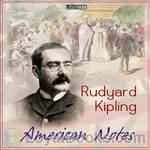 American Notes
American Notes
In American Notes, Rudyard Kipling, the Nobel Prize-winning author of the Jungle Book, visits the USA. As the travel-diary of an Anglo-Indian Imperialist visiting the USA, these American Notes offer an interesting view of America in the 1880s. Kipling affects a wide-eyed innocence, and expresses astonishment at features of American life that differ from his own, not least the freedom (and attraction) of American women. However, he scorns the political machines that made a mockery of American democracy, and while exhibiting the racist attitudes that made him controversial in the 20th century concludes “It is not good to be a negro in the land of the free and the home of the brave... | |
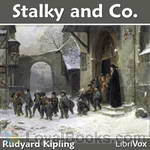 Stalky and Co.
Stalky and Co.
Rudyard Kipling published Stalky & Co. in 1899. Set at an English boarding school in a seaside town on the North Devon coast. (The town, Westward Ho!, is not only unusual in having an exclamation mark, but also in being itself named after a novel, by Charles Kingsley.) The book is a collection of linked short stories, with some information about the eponymous Stalky’s later life. Beetle, one of the main trio, is said to be based on Kipling himself, while Stalky may be based on Lionel Dunsterville... | |
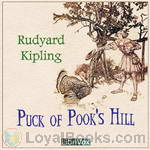 Puck of Pook's Hill
Puck of Pook's Hill
Puck of Pook’s Hill is a children’s book by Rudyard Kipling, published in 1906, containing a series of short stories set in different periods of history. The stories are all told to two children living near Pevensey by people magically plucked out of history by Puck. | |
 Plain Tales from the Hills
Plain Tales from the Hills
Named a "prophet of British imperialism" by the young George Orwell, and born in Bombay, India, Rudyard Kipling had perhaps the clearest contemporary eye of any who described the British Raj. According to critic Douglas Kerr: "He is still an author who can inspire passionate disagreement and his place in literary and cultural history is far from settled. But as the age of the European empires recedes, he is recognised as an incomparable, if controversial, interpreter of how empire was experienced. That, and an increasing recognition of his extraordinary narrative gifts, make him a force to be reckoned with." This force shines in THE PLAIN TALES FROM THE HILLS. (Introduction by Mike Harris) | |
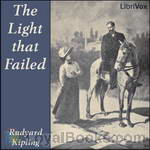 The Light that Failed
The Light that Failed
This novel, first published in 1890, follows the life of Dick Heldar, a painter. Most of the novel is set in London, but many important events throughout the story occur in Sudan or India. It was made into a 1916 film with Jose Collins and a 1939 film by Paramount starring Ronald Colman. | |
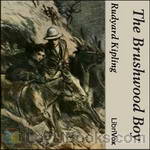 The Brushwood Boy
The Brushwood Boy
The experiences in public school, Sandhurst and military life in India of Major George Cottar together with his adventures in the dream world he discovers and frequents. | |
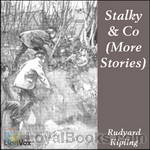 Stalky & Co (More Stories)
Stalky & Co (More Stories)
This small collection puts together stories by Kipling that feature the characters from Stalky & Co. but which for some reason were not included in the book Stalky & Co. Of these the more interesting is the first, “Stalky”, which introduces the characters and is full of the humour and understanding of adolescent males and their timeless jostling with adult powers that characterise the stories in Stalky & Co.“Stalky” was the first of the tales to be written, and was published in 1898, so it is difficult to understand how it came to be omitted from the book in 1899... | |
 Smoke Upon Your Altar Dies
Smoke Upon Your Altar Dies
LibriVox volunteers bring you 15 recordings of The Smoke Upon Your Altar Dies by Rudyard Kipling. This was the Weekly Poetry project for January 6, 2013.Joseph Rudyard Kipling was an English short-story writer, poet, and novelist chiefly remembered for his tales and poems of British soldiers in India, and his tales for children. Kilping was one of the most popular writers in England, in both prose and verse, in the late 19th and early 20th centuries. In 1907 he was awarded the Nobel Prize in Literature, making him the first English-language writer to receive the prize, and to date he remains its youngest recipient... | |
By: Rupert Hughes (1872-1956) | |
|---|---|
 Excuse Me! (Dramatic Reading)
Excuse Me! (Dramatic Reading)
What happens when a mix of lovers get stuck together on a coast-to-coast train? Mainly hilarity. There is every kind of couple imaginable. One serviceman and his bride-to-be are trying desperately to get married but can't find a clergyman to perform the rites. They don't know that right in their midst is a preacher disguised as a man of the world so he and his wife can enjoy a carefree vacation. Then there is a drunk mourning his separation from the wife who just happens to be on the same train. There is even a confirmed bachelor who discovers that a confirmed spinster is his long-lost love from years ago... | |
By: Ruth Plumly Thompson (1891-1976) | |
|---|---|
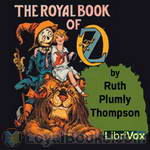 The Royal Book of Oz
The Royal Book of Oz
The Royal Book of Oz (1921) is the fifteenth in the series of Oz books, and the first to be written by Ruth Plumly Thompson after L. Frank Baum’s death. Although Baum was credited as the author, it was written entirely by Thompson. The Scarecrow is upset when Professor Wogglebug tells him that he has no family, so he goes to where Dorothy Gale found him to trace his “roots.” Then he vanishes from the face of Oz. Dorothy and the Cowardly Lion mount a search for their friend, but when that is successful, they will need to become a rescue party! | |
By: Ruth Stiles Gannett (1923-) | |
|---|---|
 My Father's Dragon
My Father's Dragon
A story about a boy who befriends a cat and then sets off on an adventure to rescue a dragon. Illustrations from the original book can be seen at the e-text link. | |
By: S. Baring-Gould (1834-1924) | |
|---|---|
 The Book of Ghosts
The Book of Ghosts
Reverend Sabine Baring-Gould (1834-1924) was an English hagiographer, antiquarian, novelist and eclectic scholar. During his life, he published more than 100 books, among them this collection of ghost stories. | |
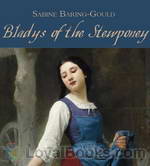 Bladys of the Stewponey
Bladys of the Stewponey
The setting, geography and history of this story by Rev'd Sabine Baring-Gould, author of Onward Christian Soldiers and other well-known hymns, are all accurate, or at least as accurate as local lore will allow. Kinver has long been a midlands beauty spot, and the UK National Trust own and open one of the rock-dwellings mentioned. The 'Stewponey' too was an inn until a year or two into the twenty-first century - the present reader having stopped there for a drink and a meal many times.The story, whether... | |
 Only a Ghost! by Irenæus the Deacon
Only a Ghost! by Irenæus the Deacon
Baring-Gould's humorous observations on the various Christian sects to be found in "the most learned church in the most religious country in the world" (i.e., London in 1870) contains a challenge to Christians of today to focus on the substance of faith rather than the forms of public worship. | |
 Pennycomequicks
Pennycomequicks
The Pennycomequicks is the charming and witty story of a dysfunctional English family in the late 19th century, scattered to the winds, scarred and battered by human and Divine tragedy, struggling for sustenance of the material and / or immaterial kind. | |
By: S. S. Van Dine (1888-1939) | |
|---|---|
 Benson Murder Case - A Philo Vance Story
Benson Murder Case - A Philo Vance Story
The Benson Murder Case – A Philo Vance Story is the first of a series of twelve popular mysteries set in New York during the Jazz Age. S. S. Van Dine is the nom de plume of prominent art critic, and member of New York’s avant-garde, W. H. Wright. He rapidly became one of the country’s best-selling authors and the series remained immensely popular for decades, as Philo Vance was featured in dozens of movies, plays and radio shows. Van Dine’s novels marked a sharp departure from earlier detective fiction... | |
By: Saint Patrick (d. 461 or 493) | |
|---|---|
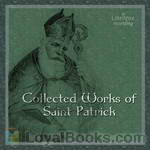 Collected Works of Saint Patrick
Collected Works of Saint Patrick
St. Patrick’s Breastplate – This prayer is attributed to St. Patrick and his diciples. It is written with some celtic pagan elements, but is definitely a Christian prayer asking God for protection through daily life. A Letter to the Soldiers of Coroticus – Patrick writes this letter to excommunicate the soldiers of Coroticus’ army who pillaged villages in Ireland and forced many Christian converts into slavery. Confession – A short autobiography by St. Patrick who tells of being abducted... | |
By: Saki (1870-1916) | |
|---|---|
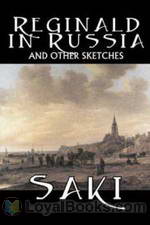 Reginald
Reginald
Saki was the pen name of the British author Hector Hugh Munro (1870 – 1916). His witty, biting and occasionally odd short stories satirised Edwardian culture. Saki is considered a master of the short story and has been compared to O. Henry and Dorothy Parker as well as Noel Coward and Oscar Wilde (who clearly influenced Saki). His first collection of short stories, Reginald, was published by Methuen Press in 1904 though these stories first appeared in the ‘Westminster Gazette’. The stories... | |
 The Chronicles of Clovis
The Chronicles of Clovis
This is the third collection of short stories by Saki, following on from “Reginald” and “Reginald in Russia”. Although some of the stories have characters that do not appear elsewhere in the collection, many of them are loosely centred round the young Clovis Sangrail (effectively a reincarnation of Reginald). | |
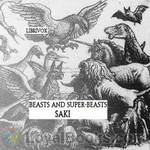 Beasts and Super-Beasts
Beasts and Super-Beasts
Saki (December 18, 1870 – November 14, 1916) was the pen name of British author Hector Hugh Munro. Saki’s world contrasts the effete conventions and hypocrisies of Edwardian England with the ruthless but straightforward life-and-death struggles of nature. Nature generally wins in the end. | |
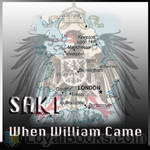 When William Came
When William Came
We have had many novels about alternate histories, often of the ‘What would have happened if Hitler had won the war’ type and this is another – except that this one is set in 1913 and the ‘William’ of the title is that old bogeyman ‘Kaiser Bill’. For some reason, at the height of Britain’s power, the fear of invasion was common at that time. (See ‘The Riddle of the Sands’, ‘The Battle of Dorking’, ‘Spies of the Kaiser’ or even ‘The War of the Worlds’)WARNING:- Contains mild anti-semitism and jingoism typical of the period | |
 The Toys of Peace
The Toys of Peace
This is the fifth collection of short stories by Saki (H.H. Munro), and was published posthumously in 1923. Even so, many of the stories are quite up to the standard of those collected earlier. | |
By: Samuel B. Allison | |
|---|---|
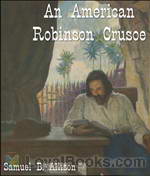 An American Robinson Crusoe
An American Robinson Crusoe
An American Robinson Crusoe is a short version of the original story. An indolent, rebellious teen goes on a marine voyage against his parents’ wishes. The ship (and all of its crew) is lost in a storm, but Robinson makes it to a deserted island. He has no tools, no weapons, but he lives for over 28 years on the island. He befriends many animals on the island and after over 20 years living solo, he is joined by a young “savage” who becomes his constant companion. The transformation from the young, lazy teen to a self-sustaining, incredibly knowledgeable adult is one of the major themes in the story. | |
By: Samuel Butler (1835-1902) | |
|---|---|
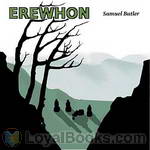 Erewhon
Erewhon
Erewhon, or Over the Range is a novel by Samuel Butler, published anonymously in 1872. The title is also the name of a country, supposedly discovered by the protagonist. In the novel, it is not revealed in which part of the world Erewhon is, but it is clear that it is a fictional country. Butler meant the title to be read as the word Nowhere backwards, even though the letters “h” and “w” are transposed. It is likely that he did this to protect himself from accusations of being unpatriotic, although Erewhon is obviously a satire of Victorian society. | |
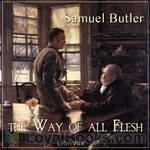 The Way of All Flesh
The Way of All Flesh
The Way of All Flesh (1903) is a semi-autobiographical novel by Samuel Butler which attacks Victorian-era hypocrisy. Written between 1873 and 1884, it traces four generations of the Pontifex family. It represents the diminishment of religious outlook from a Calvinistic approach, which is presented as harsh. Butler dared not publish it during his lifetime, but when it was published it was accepted as part of the general revulsion against Victorianism. | |
By: Samuel Hopkins Adams (1871-1958) | |
|---|---|
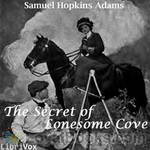 The Secret of Lonesome Cove
The Secret of Lonesome Cove
A body is found on the beach not far from a New England town one morning. Curiously, nobody recognizes the dead woman, and nobody in or near the town seems to be a suspect in a possible murder, therefore most of them assume that she simply washed ashore from a passing vessel. Only problem is vessels didn't pass that stretch of the coast because of it's peculiar tides and eddies; hence its name, Lonesome Cove. Following the finding of the body, the officials of the town start acting a bit peculiar towards how to handle the dead body... | |
 Flaming Youth
Flaming Youth
This book tells the story of the Fentriss sisters and their mother. They are educated and rich. They live in a suburb. They are looking for love. Their quest for love leads them to many different places. F. Scott Fitzgerald wrote about it: "the novel persuaded certain moralistic people that a woman could be seduced without being immoral". It was scandalous for the time because of the frank descriptions of sexuality and relationships. Yet to the modern readers it may seem as if someone wrote this book only a few years ago... | |
By: Samuel Johnson (1709-1784) | |
|---|---|
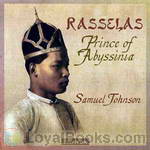 Rasselas, Prince of Abyssinia
Rasselas, Prince of Abyssinia
In this enchanting fable (subtitled The Choice of Life), Rasselas and his retinue burrow their way out of the totalitarian paradise of the Happy Valley in search of that triad of eighteenth-century aspiration – life, liberty and happiness.According to that quirky authority, James Boswell, Johnson penned his only work of prose fiction in a handful of days to cover the cost of his mother’s funeral. The stylistic elegance of the book and its wide-ranging philosophical concerns give no hint of haste or superficiality... | |
By: Samuel Merwin | |
|---|---|
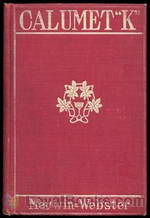 Calumet "K"
Calumet "K"
"A novel, with several elements of rather unusual interest. As a tale, it is swift, simple, and absorbing, and one does not willingly put it down until it is finished. It has to do with grain-elevator business, with railways, strikes, and commercial and financial matters generally, woven skilfully into a human story of love." --The Commercial Advertiser "'Calumet "K"' is a novel that is exciting and absorbing, but not the least bit sensational. It is the story of a rush.... The book is an unusually good story; one that shows the inner workings of the labor union, and portrays men who are the bone and sinew of the earth... | |
 The Merry Anne
The Merry Anne
This 1904 maritime adventure is set in the Great Lakes region, upon water and in wood. Our hero is caught in a smuggling scheme and may lose his boat and his sweetheart. With a fast pace and interesting plot, the story is made realistic with very modern "bad-guys". | |
By: Samuel Merwin and Henry Kitchell Webster (1874-1936 and 1875-1932) | |
|---|---|
 The Short Line War
The Short Line War
"The Short Line War is a story that will appeal more particularly to the sterner sex, and we take it that the hyphenated name, Merwin-Webster, stands for two healthy-minded young men who have put their heads together and who have mapped out this story of a railroad war, in which politics form a considerable part. Jim Weeks is the central figure in the fight, and we like him so much better for knowing of the romance in his early life. He was a man 'without much instinct or imagination; he took everything seriously and literally, he could not understand a whim'--therefore a very foolish little woman came into his life only to leave it desolate... | |